
Reading is a town in Berkshire, England. Most of its built-up area lies within the Borough of Reading, although some outer suburbs are parts of neighbouring unitary authority areas. Located in the Thames Valley at the confluence of the rivers Thames and Kennet, Reading is 40 miles (64 km) east of Swindon, 24 miles (39 km) south of Oxford, 40 miles (64 km) west of London and 16 miles (26 km) north of Basingstoke.

Advent is a season observed in most Christian denominations as a time of expectant waiting and preparation for both the celebration of the Nativity of Christ at Christmas and the return of Christ at the Second Coming. Advent is the beginning of the liturgical year in Western Christianity. The name was adopted from Latin adventus "coming; arrival", translating Greek parousia from the New Testament, originally referring to the Second Coming.
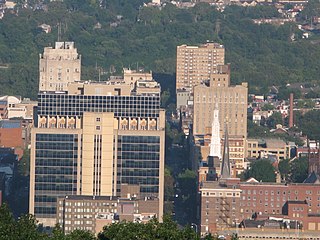
Reading is a city in and the county seat of Berks County, Pennsylvania, United States. The city had a population of 95,112 at the 2020 census and is the fourth-largest city in Pennsylvania after Philadelphia, Pittsburgh, and Allentown. Reading is located in the southeastern part of the state and is the principal city of the Greater Reading Area, which had 420,152 residents in 2020.
Wolfgang Iser was a German literary scholar.

The Pennsylvania Dutch, also known as Pennsylvania Germans, are an ethnic group in Pennsylvania and other American states. They descend from Germans who settled in Pennsylvania during the 17th, 18th and 19th centuries, primarily from the Palatinate, and other German-speaking areas, including Baden-Württemberg, Hesse, Saxony, and Rhineland in Germany, the Netherlands, Switzerland, and France's Alsace-Lorraine region.

Philip Schaff was a Swiss-born, German-educated Protestant theologian and ecclesiastical historian, who spent most of his adult life living and teaching in the United States.

Fritz Julius Kuhn was a German Nazi activist who served as elected leader of the German American Bund before World War II. He became a naturalized United States citizen in 1934, but his citizenship was cancelled in 1943 owing to his status as a foreign agent of Nazi Germany. Kuhn served prison time for larceny and forgery from 1939 to 1943 and upon release was immediately interned by the federal government as an enemy agent. He was deported in 1945 and later served further prison time in post-war Germany before dying in 1951.

Ernst Alfred Cassirer was a German philosopher. Trained within the Neo-Kantian Marburg School, he initially followed his mentor Hermann Cohen in attempting to supply an idealistic philosophy of science.

Goring-on-Thames is a village and civil parish on the River Thames in South Oxfordshire, Oxfordshire, England, about 5+1⁄2 miles south of Wallingford and eight miles northwest of Reading. It had a population of 3,187 in the 2011 census, put at 3,335 in 2019. Goring & Streatley railway station is on the main Oxford–London line. Most land is farmland, with woodland on the Goring Gap outcrop of the Chiltern Hills. Its riverside plain encloses the residential area, including a high street with shops, pubs and restaurants. Nearby are the village churches – one dedicated to St Thomas Becket has a nave built within 50 years of the saint's death, in the early 13th century, along with a later bell tower. Goring faces the smaller Streatley across the Thames. The two are linked by Goring and Streatley Bridge.
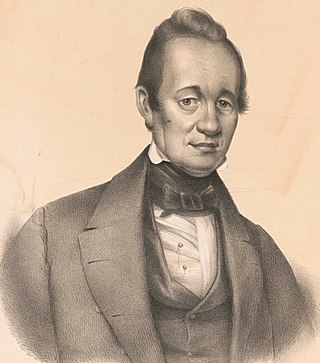
Henry Augustus Philip Muhlenberg was an American political leader and diplomat. He was a member of the Muhlenberg family political dynasty.

Jacob Albright was an American Christian leader, founder of Albright's People which was officially named the Evangelical Association in 1816. This church as a denomination is still in existence, headquartered in Myerstown, Pennsylvania.
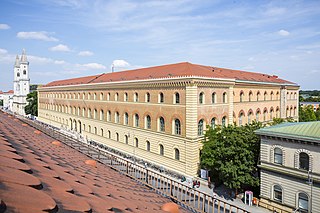
The Bavarian State Library in Munich is the central "Landesbibliothek", i. e. the state library of the Free State of Bavaria, the biggest universal and research library in Germany and one of Europe's most important universal libraries. With its collections currently comprising around 10.89 million books, it ranks among the leading research libraries worldwide. The Bayerische Staatsbibliothek furthermore is Europe's second-largest journals library. Furthermore, its historical holdings encompass one of the most important manuscript collections of the world, the largest collection of incunabula worldwide, as well as numerous further important special collections. Its collection of historical prints before 1850 totals almost one million units.
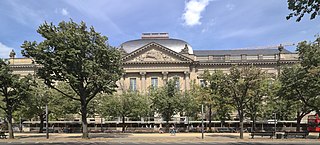
The Berlin State Library is a universal library in Berlin, Germany and a property of the Prussian Cultural Heritage Foundation. Founded in 1661, it is one of the largest libraries in Europe, and one of the most important academic research libraries in the German-speaking world. It collects texts, media and cultural works from all fields in all languages, from all time periods and all countries of the world, which are of interest for academic and research purposes.
Katakombenschulen were clandestine schools established in Italian South Tyrol during the 1920s period of Fascist Italianization.

Gymnasium, in the German education system, is the most advanced and highest of the three types of German secondary schools, the others being Hauptschule (lowest) and Realschule (middle). Gymnasium strongly emphasizes academic learning, comparable to the British sixth form system or with prep schools in the United States. A student attending Gymnasium is called a Gymnasiast. In 2009/10 there were 3,094 gymnasia in Germany, with c. 2,475,000 students, resulting in an average student number of 800 students per school.
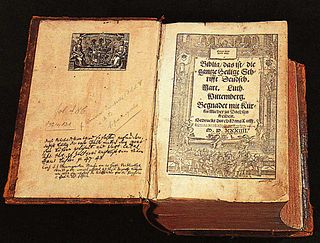
The Luther Bible is a German language Bible translation by the Protestant reformer Martin Luther. A New Testament translation by Luther was first published in September 1522, and the completed Bible, containing a translation of the Old and New Testaments with Apocrypha, in 1534. Luther continued to make improvements to the text until 1545. It was the first full translation of the Bible into German that used not only the Latin Vulgate but also the Greek.

On Christmas Eve, December 24, 1968, the crew of Apollo 8 read from the Book of Genesis as they orbited the Moon. Astronauts Bill Anders, Jim Lovell, and Frank Borman, the first humans to travel to the Moon, recited verses 1 through 10 of the Genesis creation narrative from the King James Bible. Anders read verses 1–4, Lovell verses 5–8, and Borman read verses 9 and 10.
Around the world, television sets glowed with the broadcast. One in four people on Earth—roughly a billion people spread among 64 countries—listened to the reading. Within 24 hours, recorded broadcasts of the address from the moon reached people in another 30 countries. Audiences in North and South America as well as Europe tuned in live thanks to the recently launched Intelsat 3 satellite. COMSAT put the satellite into operation a week ahead of schedule so that international audiences could follow the flight.

Art history is the study of aesthetic objects and visual expression in historical and stylistic context. Traditionally, the discipline of art history emphasized painting, drawing, sculpture, architecture, ceramics and decorative arts; yet today, art history examines broader aspects of visual culture, including the various visual and conceptual outcomes related to an ever-evolving definition of art. Art history encompasses the study of objects created by different cultures around the world and throughout history that convey meaning, importance or serve usefulness primarily through visual representations.
Neue Marx-Lektüre or NML is a revival and interpretation of Karl Marx's critique of political economy, which originated during the mid-1960s in both Western and Eastern Europe and opposed both Marxist–Leninist and social democratic interpretations of Marx. Neue Marx-Lektüre covers a loose group of authors primarily from German-speaking countries who reject certain historicizing and empiricist interpretations of Marx's analysis of economic forms, many of which are argued to spring from Friedrich Engels role in the early Marxist workers' movement.

German South West Africa was a German colony in Africa, established in 1884 with the protection of the area around Lüderitz and abandoned during World War I, when the area was taken over by the British.
















